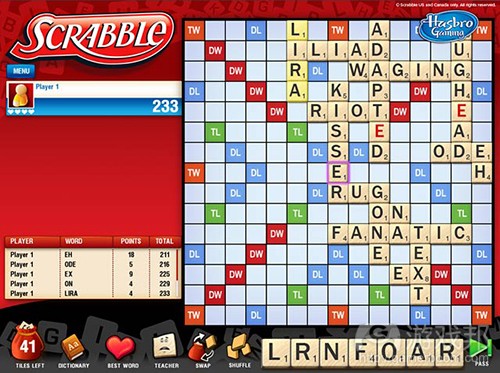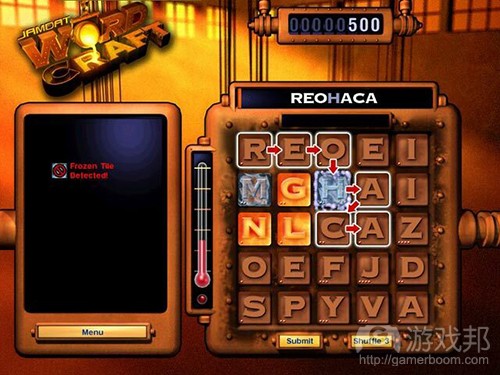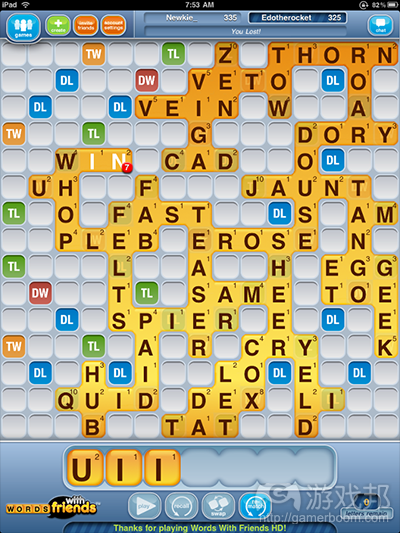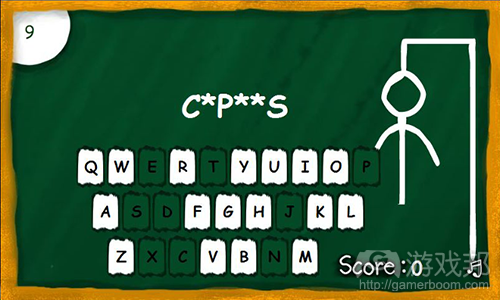分析字谜游戏类型及其机制
作者:Jonathan Bailey
人们为了沟通交流发明了文字,但人们也时常发现文字的一些新颖的用途和玩法。人们在不恰当的地方填字,寻找截然不同的文字之间的相似性,并以找到发音相同的文字为乐。人们总能在组合、打破又重组文字之间找到乐趣。简单而言,人们喜欢玩字谜游戏。
世界上每个地区每个历史时期都有字谜游戏,最早记录的字谜游戏是发现于巴比伦学院文本的谜题。数年年之后,The Oxford A-Z of Word Games列出了与字谜有关的250款游戏。
字谜游戏通常很简单,不需要太多设备。我们可以用纸笔、声音甚至是肢体动作来玩游戏。最近这类游戏也被搬到了游戏桌面和电子设备上。
我们Gamelogic工作室的成员都很喜欢玩字谜游戏。文字具有许多特征,每个特征都可以是一种游戏!有些字谜游戏涉及的文字的意义(如Homonym Game),有些涉及的是发音(Crambo),还有些是文字的拼写(Backenforth)。也有一些是以打乱和重组字母为规则的游戏(Anagrams),连锁词语的游戏(Scrabble),甚至还有避免组词的游戏(Ghost)。
我们对适合在电子设备上体验的字谜游戏尤其感兴趣。字谜游戏与多数其他电子游戏不同的是,它有赖于玩家对游戏外部知识的储备,这是游戏和一个大型知识体系(词汇,意义等)之间的钮带。计算机可以妥善处理文字(字母)的结构成份,但却无法处理例如意义(同义词,定义)或者发音(双关语,押韵)等其他层面。
因为我们对适合电脑操作的游戏比较感兴趣,所以我们只会考虑至少满足以下条件之一的游戏:
*单人模式
*能够转化为单人模式
*含有AI的多人模式
字谜游戏的机制取决于它们所处理的语言。语言的一个明显区别就在于构词造句的方式。英语使用的是字母系统,并且具有一些相对难以拼写的字词,因此使用拼写机制的游戏相当受欢迎。西班牙语的拼写更为简单,但为特定字母增加发音就会创造出完全不同的字母。
日语书写系统的基本单位是音节,而中文使用的是语标系统。为了控制我们这项调查工作的范围,我们只考虑用英语制作的游戏。当然,我们所发现的一些游戏也会涉及到其他语言。
许多字谜游戏还会含有其他游戏类型(例如数字游戏)的机制。这包括对网格、贴图和用户操作行为的使用。许多这类机制是制作字谜游戏的必需要素,但我们不打算在本文赘述这些内容。我们仅列出特别指向字谜游戏的机制。
定义
模式
模式就是在不提供文字的情况下,表达一个词语的某些方式。模式的一个例子就是常规表达。更简单的一个例子就是使用通配符来说明一个字词,而这个通配符可以是字母表中的任何一个字母,可以用问号等符号来表示。例如G??E就可以说是GAME这个词的一种模式。
字母
可以将一组字符视为一个单位。例如,QU这个字符组在此就可以视为一个字母。
洗牌
随机打乱字母,确保原来的字词和打乱后的字词之间保持距离。
易位构词
通过重组另一个字词的字母而形成的字词,短语或者名称。
变形
通过插入、移除、替换或重组字母改变一个词语。
编辑距离
用最少的编辑次数量将一个词转换成另一词。游戏所允许的编辑类型也会给予一些不同的值。可以插入字母,移除字母,以及替换字母,这就是所谓的编辑距离。如果只允许替换字母,那就是代码距离。在字谜游戏中,这些参数有时候会用于确保在打乱字母的时候无法辩认出字词,或者用于构造词句的规则。
部分字词
一个字母串未必就是一个完整的词,但加入更多字母时就可以组词了。
重叠
两个部分字符相同的词语放在一起可形成首尾衔接的情况就称为重叠。例如Why和hybrid这两个词中的hy就属于这种情况。
游戏分类
组词
在这类游戏中,玩家必须在一系列字母中组词。这些字母可能以列或者网格等不同方式组合及呈现(例如Boggle,Words with Friends,Anagrams)。
解谜
在这类游戏中,玩家必须解开谜题来获取隐茂于其中的一个或多个字词(如Hangman,Crossword,Quizl)。
搜字
在这类游戏中,玩家必须找到混杂在随机字母中的完整字词(如Word Search,Words within Words)。
游戏环境
字词生成
游戏生成需要玩家去发现或获取的字词。其生成的字词类型和数量取决于游戏规则。
这些字词的生成来源可能是:
*从字典中随机抽取
*从字典的字集(如分类)中随机抽取(Crossword)
*根据限制条件随机抽取,比如:模式,包括部分字词(如Missing Vowels,Missing letters);字母数字(Hangman)。
这些字词可以是一次生成一个(Hangman),也可以是一次生成多个(Word Search)。
字词洗牌
制造谜题的一个简单方法就是生成词语,然后更改每个字母的位置,由此隐藏该词语。这就是所谓的洗牌。可以随机洗牌或打乱字词(Anagrams)。
字母生成
游戏生成字母让玩家来组词(Boggle),或者干扰玩家找到相关字词(Word Search)。其中生成的字母数量取决于游戏规则或者桌面大小。
这些生成的字母可能有如下特点:
*随机性
*频率,根据生个字母出现于字典的频率来决定
*根据字母分类,例如X数量的元音和Y数量的辅音(Words!!)
揭露信息
在文字解谜游戏中,玩家会获得一些查找某个字词的信息提示。这种信息可能不会变化,并且是在游戏刚开时前就已经揭露(静态揭露),或者会作为游戏过程中的一种反馈,响应玩家的操作行为(动态揭露)。
静态揭露包括为玩家提供:
*字词模式
显示包含在字词中的一些字母(Missing Letters)
显示字词所包括的字母数量(Abbreviations,Hangman)
*定义或描述(Crossword)
*分类(Word Search)
*相关字词(Password,Fill-ins)
*颠倒字词(Brakenforth)
*颠倒字母(Clue Words)
*可能使用了该系列字母的一些字词(Wordster)
动态揭露包括
*增加模式的特性(Hangman)
*解决方法中涉及的正确字母数量(Crash)
玩家操作行为
组词
组词游戏的目的在于使用一系列字母组词。词语可以是自由组合或者根据特定条件组词。以下就是玩家必须组词的一些例子:
*使用一些特定的字母数量(Sinks,Inflation)来组词
*用一个集合中的字母来组词,所用到的字母在一个词中只能出现一次,或者在所有组成的词中都只能出现一次。
*使用一个集合的所有字母来组词(Unscramble,Anagrams)
*使用特定顺序的字母来组词(Word Portal)
*根据以下模式来组词:
包含一个或多个字母(Polygon,Catchword,Diagrams,Mischmasch)
从一个字母开始(AA)
以一个字母结束(Endlings)
以一个字母开始或结束(Tops and Tails)
以一个特定的前缀(Prefixes)开始或以一个特定的后缀结束(Suffixes)
*以特定字母结束或开始(Alpha)
*包含一个已经出现字词中的一个字母(Scrabble,Crossword,Triwordz)
*与其他字词重叠(Word Chain,Geography)
*包含至少一个来自多个字母集的字母(QuadWord)
*包含字母表的连续字母(Sequences)
*与之前出现的字词不同的字母(Uncrash)
*还未使用过的字词(Boggle)
避免组词
玩家必须逐个添加字母,令其添加的字母总是某个字词的开始但永远不会组成完整的词。
找字词
玩家必须从网格或者另一个字词中一系列字母中找到一个或多个词(Word Search,Hex Words,Kangaroo Words)。
填空
许多字谜游戏使用的是网格形式,玩家必须根据游戏规则在网格中填空。游戏规则会决定玩家必须填写多少个字母来组词,以及该在哪个空格中填字母。其中例子包括:
*网格中的任意空格(Word Battleships)
*在预先确定的空格(Kris Kros,Lynx,crossword)
*从边缘到边缘填空(Sinks)
字词变形
这类涉及字词变形的游戏有两种目标:
首先,玩家必须将起始字词变形为目标字词,每次变形都必须生成一个有效的字词。变形所需次数取决于编辑距离。变形的规则例子包括:
*一次替换一个字母(Doublets,Word Ping Pong)
*一次添加或移除一个字母(Triplets)
*及时移除和添加多个字母同时要保留连续的字母集(Syzygies)
其次,玩家必须继续为一个起始字词进行变形,直到无法再组成完整的字词为止。这种变形规则包括:
*一次删除一个字母(Shrink Words)
*一次添加一个字母,之后再重组字母(Transaddtions)
*变化性地添加和移除一个字母(Instertion-Deletion Network)
经*一次添加一个字母,在网格中形成连锁的字词(Ragaman)
结束游戏的条件
与所有游戏一样,字谜游戏也有结束条件,玩家的结局也有输赢。玩家在以下情况下会结束游戏:
*找到所有字词(Word Search)
*获得所有字词(Crossword,Hangman)
*组成所有字词(Jarnac)
*使用所有字母(Alphacross)
*无法再移动
没有剩余字母(Hangman,Scrabble)
没有可能的字母(Sinks)
*放弃,耗尽时间或达到指定目标。(本文由游戏邦编译,转载请注明来源,或咨询微信zhengjintiao)
Word Game Mechanics
by Jonathan Bailey
We could not find digital implementations of all of the games listed in this article. If you know of one, please post a link in the comments section. Otherwise you can find a description of each of the games in The Oxford A-Z of Word Games.
Words were invented for communication, but humans are constantly finding new and frivolous uses for them. People slot words into inappropriate places, search for similarities between entirely different words and delight in finding words that sound the same. (The Oxford Guide to Word Games, T.Augarde). Words are assembled, broken down and rebuilt again, all for the fun of it. Simply put, people like playing games with words.
Word games appear in every period of history, in every part of the world. The oldest recorded word game is a riddle found in Babylonian school texts. (The Oxford Guide to Word Games, T.Augarde).Thousands of years later, The Oxford A-Z of Word Games lists 250 games that can be played with words.
Word games are often simple and require minimal equipment. They can be played with paper and pencil, voice and even physical actions. More recently they have been played on game boards and digital devices.
We at Gamelogic are obsessed with words. Words have many characteristics and for each characteristic, there is a game! There are games that play with the meaning (Homonym Game), sound (Crambo), and spelling (Backenforth) of words. There are games that shuffle and rearrange letters (Anagrams), games of interlocking words (Scrabble), and even games that avoid making words (Ghost).
We are particularly interested in word games that are suitable for digital devices. Unlike most other video games, word games rely on outside knowledge; a link must be made between the game and a large body of agreed upon knowledge (vocabulary, meaning, and so on). While computers can deal well with the structural components of words (letters), they don’t do so well with other aspects, such as meaning (synonyms, definitions) or sound (puns or rhyming).
Because we are interested in games suitable for computer implementation, we only considered games that are one of these:
already single-player
able to be turned into single-player
have AI that can be made for multiplayer
The mechanics of word games are based on the language they are made with. A clear way in which languages differ (that are applicable to games) is how words are constructed. English uses an alphabet and has words that are relatively difficult to spell, thus games that use spelling are popular. Spelling in Spanish is typically easier, but adding accents to certain letters creates entirely new letters.
The basic units of the Japanese writing system are syllables, while Chinese uses a logographic system. To maintain a workable scope for our research, we only considered games made in English. Of course, some of our findings are also relevant to other languages.
Many word games share mechanics with other types of games such as match games (see Match Game Mechanics: An Exhaustive Survey). This includes the use of grids, tiles and user actions. Many of these mechanics are necessary to make a word game, but we decided not to include them in this article. Instead, we list the game mechanics specific to word games, within the constraints outlined above.
Definitions
Pattern
A pattern is a way of expressing some aspects of a word, without giving the word. One example of a pattern is regular expressions. A simpler example is specifying a word using wildcards where a wild card can be any letter in the alphabet and is represented as a question mark (?). For example G??E would be the pattern for GAME.
Letter
A group of characters treated as a unit. For example, the character pair QU may be treated as a letter in this sense.
Muddle
A random shuffle of a words letters that guarantees a minimum distance between the original and the muddled word.
Anagram
A word, phrase, or name formed by rearranging the letters of another word.
Transformation
A change to a word that includes inserting, removing, substituting or re-arranging letters.
Edit Distance
The (minimum) number of edits necessary to transform one word into the other. The types of edits allowed gives slightly different values. When letter insertions, letter removals, and letter substitutions are allowed, it’s called the Levenstein distance. If only substitutions are allowed, it’s called the Hamming distance. In word games, these metrics are sometimes used to ensure words are unrecognizable when the letters are shuffled, or in rules for constructing sequences of words.
Partial Word
A string of letters that is not a word, but could be a word if more letters are added.
Overlap
Two words overlap when a part of the end of one word is the beginning of the other. For example why and hybrid.
Game Classification
Word Forming
In these games, the player has to form words from a set of letters. Letters can be arranged and displayed in various ways, often in a row or on a grid (Boggle, Words with Friends, Anagrams).
(Words With Friends)
Word Solving
In these games, the player has to solve a puzzle (by means of logic) to obtain one or more words that are hidden from them (Hangman, Crossword, Quizl).
(Hidden Object Crosswords)
Word Searching
In these games, the player has to identify words that are visible but are surrounded by other letters that may or may not form other words (Word Search, Words within Words).
(The Great International Word Search)
Game environment
Word generation
Words are generated so that they can be found or obtained by the player. The type and number of words generated are dependent on the game and its rules.
Words can be generated
randomly from a dictionary
randomly from subsets of a dictionary i.e. categories (Crossword)
randomly with constraints such as
patterns, including partial words (Missing Vowels, Missing letters)
the number of letters (Hangman)
Words can be generated one at a time (Hangman) or more than one at a time (Word Search)
Word shuffling
A simple way of making puzzles, is to generate a word and then change the position of each letter to hide the word. This is known as shuffling. Words can be randomly shuffled or muddled (Anagrams).
Letter generation
Letters are generated for the player to form words (Boggle), or to distract the player from finding words (Word Search). The number of letters generated is dependent on the game rules and/or the board size.
The type of letters can be generated
randomly (Countdown)
by frequency (Scrabble), for example, according to the frequency that each letter appears in a dictionary
according to letter categories, for example X number of vowels and Y number of consonants (Words!!)
Information revelation
In word solving games, the player is given information to help them to find the word. This information can be unchanging and revealed at the beginning of the game (static revelation) or as feedback during the game, in response to the player’s actions (dynamic revelation).
Static revelations include providing the player with
word patterns
that shows some of the letters contained in the word (Missing Letters)
that shows the number of letters the word has (Abbreviations, Hangman)
definitions or descriptions (Crossword)
categories (Word Search)
related words (Password, Fill-ins)
reversed words (Brakenforth)
anagrams (Clue Words)
the number of possible words using that set of letters (Wordster)
Dynamic revelations include
increasing the specificity of patterns (Hangman)
the number of correct letters in an attempted solution (Crash)
Player actions
Form a word
The aim of word forming games is to make words using a set of available letters. Words can either be freeform or formed using constraints. Examples are when the player must make words
using a given number of letters (Sinks, Inflation)
using each letter in a set only once
for each word made (Boggle)
for all words made (Words!!)
using all of the letters in a set (Unscramble, Anagrams)
using letters in a specific order (Word Portal)
according to a pattern that
contains a letter/s (Polygon, Catchword, Diagrams, Mischmasch)
starts with a letter (AA)
ends with a letter (Endings)
starts and ends with a letter (Tops and Tails)
starts with a particular prefix (Prefixes) or ends with a particular suffix (Suffixes)
that starts and ends with the same letter (Alpha)
that contains a letter of an already played word (Scrabble, Crossword, Triwordz)
that overlaps with another word (Word Chain, Geography)
that includes at least one letter from multiple sets of letters (QuadWord)
that contains consecutive letters of the alphabet (Sequences)
that don’t share letters with previous words (Uncrash)
which haven’t been used before (Boggle)
Avoid making a word
The player must add letters one by one such that the letters added so far are always the beginning of a word but never a full word. (Ghost, Super Ghost)
Find a word
The player must identify a word/s among a set of letters, often in a grid (Word Search, Hex Words) or within another word (Kangaroo Words).
Fill an empty grid
Many word games use grids where the player must fill a grid with words according to rules. The rules determine how many letters the words must have and where words can be placed on the grid and in relation to other words. Examples include
anywhere on the grid (Word Battleships)
in predefined spaces (Kris Kros, Lynx, Crossword)
from edge to edge (Sinks)
Transform a word
There are two types of goals for games that involve transforming words.
In the first, the player must transform a starting word into a target word, where each transformation must result in a valid word. The number of transformations needed will depend on the edit distance. Example rules for a transformation include
substituting one letter at a time (Doublets, Word Ping Pong)
adding or removing one letter at a time (Triplets)
removing and adding multiple letters at time while always leaving a consecutive set of letters (Syzygies)
In the second, the player must continue to make transformation to a starting word, until a valid word cannot be formed. Example rules for a mutation include
deleting one letter at a time (Shrink Words)
adding one letter at a time and then re-arranging the letters (Transaddtions)
removing one letter at a time and then re-arranging the letters (Transdeletions),
alternatively adding and removing one letter at a time (Insertion-Deletion Network)
adding one letter at a time to form interlocking words on a grid (Ragaman)
End game conditions
Like all games, there are conditions that end word games, with the player winning or losing the game. Word games end when the player has
found all words (Word Search)
obtained all words (Crossword, Hangman)
formed all words (Jarnac)
used all letters (Alphacross)
no more moves
no remaining letters (Hangman, Scrabble)
no more possible words (Sinks)
given up, run out of time up or reached a points target(source:gamasutra)
上一篇:游戏开发社区发展的6大阶段
下一篇:游戏设计师该如何有效利用游戏分析













































